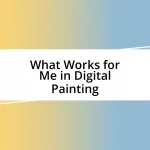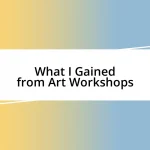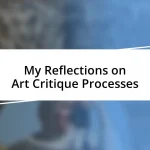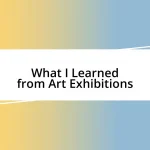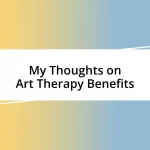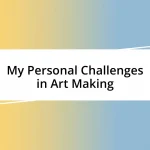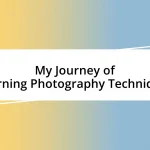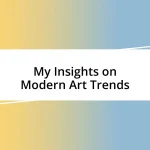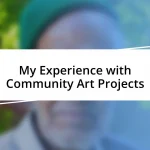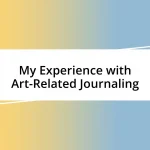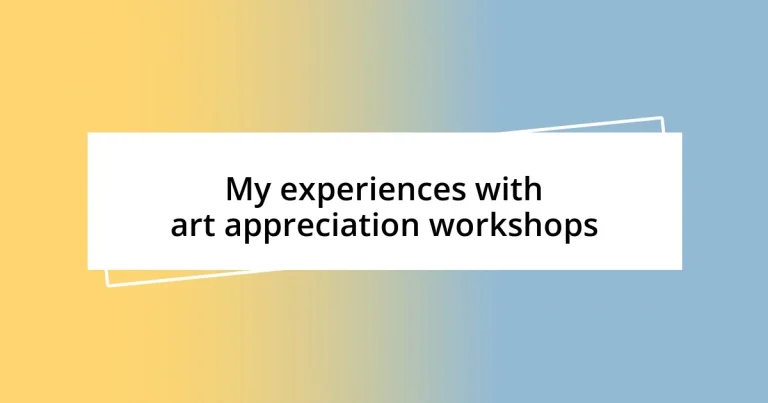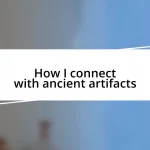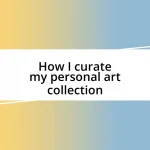Key takeaways:
- Art appreciation workshops foster personal connections and emotional responses, enhancing participants’ understanding of art through shared experiences and diverse perspectives.
- Key benefits of attending workshops include enhanced creativity, building confidence, networking opportunities, and receiving expert guidance which collectively enrich the artistic journey.
- Reflecting on past experiences and keeping a visual diary can reveal patterns in artistic growth, help track progress, and encourage deeper introspection into one’s creative narrative.
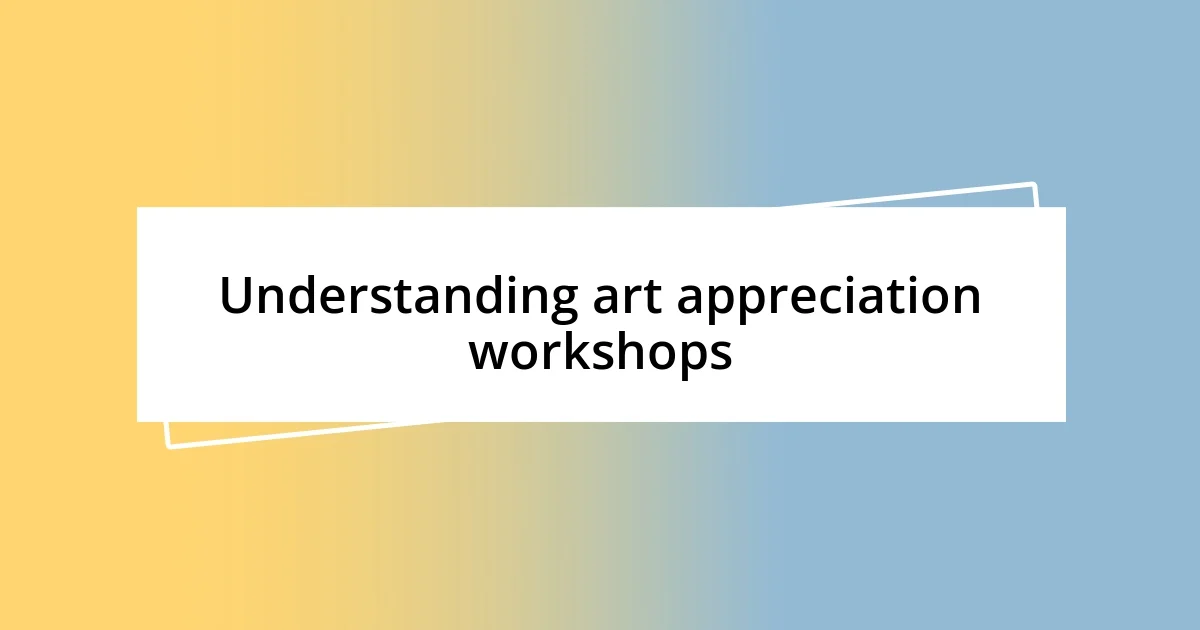
Understanding art appreciation workshops
Art appreciation workshops offer a unique opportunity to deepen our understanding of artistic expression. I remember attending one where the instructor encouraged us to share our emotional responses to various pieces. It was fascinating to hear how a simple brushstroke could evoke nostalgia for one person and a sense of wonder in another. Isn’t it incredible how art can connect us in such personal ways?
In these workshops, you’re often guided through discussions that unravel the context behind artworks. I recall diving into the history of Impressionism and how the artists sought to capture fleeting moments. The more we learned, the more I found myself appreciating the techniques and emotions that went into each piece. It made me wonder: how many stories have I overlooked just because I didn’t take a moment to pause and reflect?
Participating in group critiques during these workshops can also be transformative. Sharing your thoughts and hearing others’ perspectives creates a rich tapestry of insights. I remember feeling nervous at first, but the supportive environment helped me articulate my view and recognize the value in diverse interpretations. How might your perspective shift if you engaged more openly with others in discussing art? Each workshop experience not only enhances knowledge but fosters a sense of community that resonates long after the session is over.
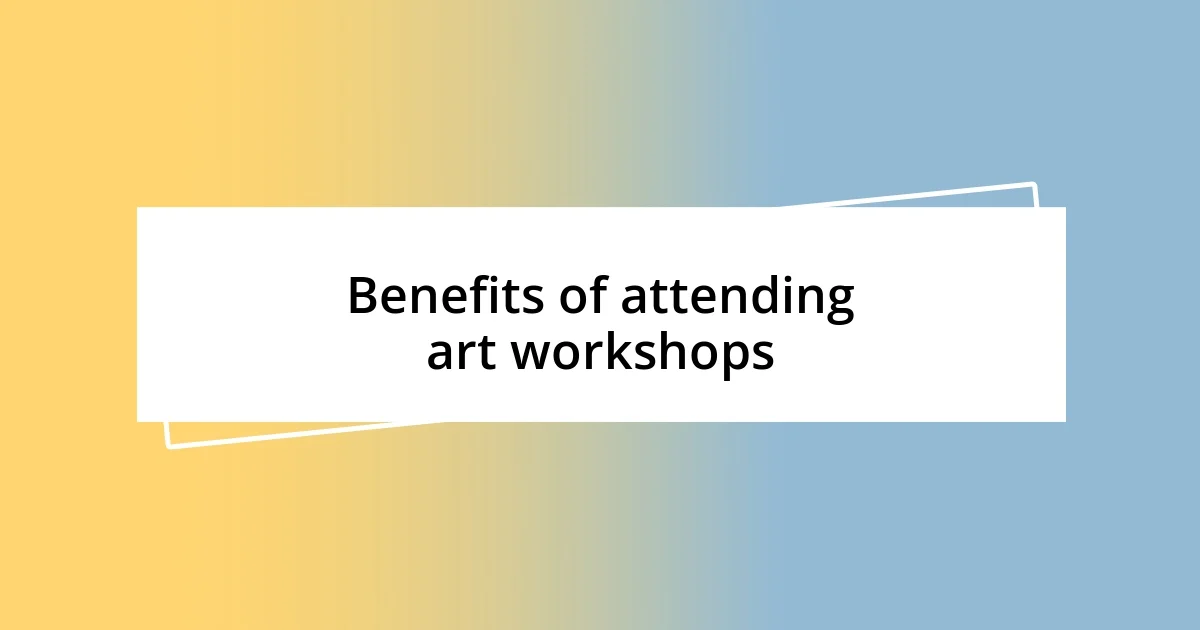
Benefits of attending art workshops
One of the standout benefits of attending art workshops is the personal growth that emerges from the experience. I still remember the thrill of creating my first piece alongside seasoned artists. Initially, I felt intimidated. However, the supportive atmosphere allowed me to let go of my inhibitions and truly express myself. It transformed my view on art from something intimidating into a joyous exploration of self-expression.
Here are some key benefits you can anticipate when attending art workshops:
- Enhancing creativity: Workshops encourage you to experiment with different mediums and techniques.
- Building confidence: Each completed project boosts your self-esteem and validates your artistic capabilities.
- Networking opportunities: You meet like-minded individuals who share your passion and can inspire future collaborations.
- Expert guidance: You receive valuable feedback from experienced instructors, helping you refine your skills.
- Cultural enrichment: Exposure to diverse artistic styles broadens your understanding and appreciation of art as a whole.
Through my experiences, I’ve seen firsthand how these workshops can ignite a deeper passion for art while fostering lifelong connections.
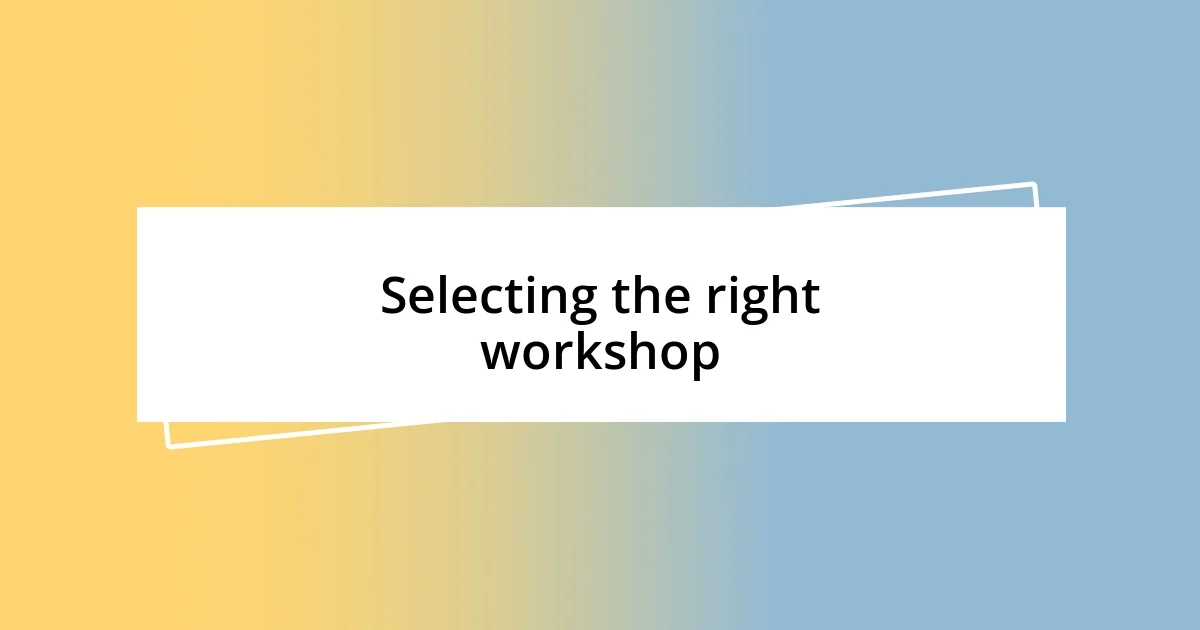
Selecting the right workshop
When it comes to selecting the right art appreciation workshop, it’s essential to consider the workshop’s focus and structure. Personally, I find that workshops with a clear theme, such as modern art or traditional techniques, often provide a more enriching experience. This allows participants to delve deeper into specific topics, making each session feel more purposeful and engaging.
The instructor’s expertise can significantly influence your experience. I once attended a workshop led by an artist whose passion for contemporary pieces was contagious. Their ability to weave personal stories around the artworks not only made the sessions lively but also encouraged me to explore beyond my comfort zone. Evaluating potential instructors and their backgrounds can help you find someone whose approach resonates with you.
Overall, considering the location and duration is vital too. I remember being hesitant about a weekend workshop far away, but it turned out to be an unforgettable getaway that enriched my perspective on art. A comfortable and inspiring setting can enhance creativity. Take the time to reflect on what aspects matter most to you and choose wisely.
| Factor | Considerations |
|---|---|
| Workshop Focus | Choose based on themes that interest you. |
| Instructor Expertise | Look for instructors with the right background and passion. |
| Location and Duration | Prioritize convenience and consider the setting’s impact on creativity. |
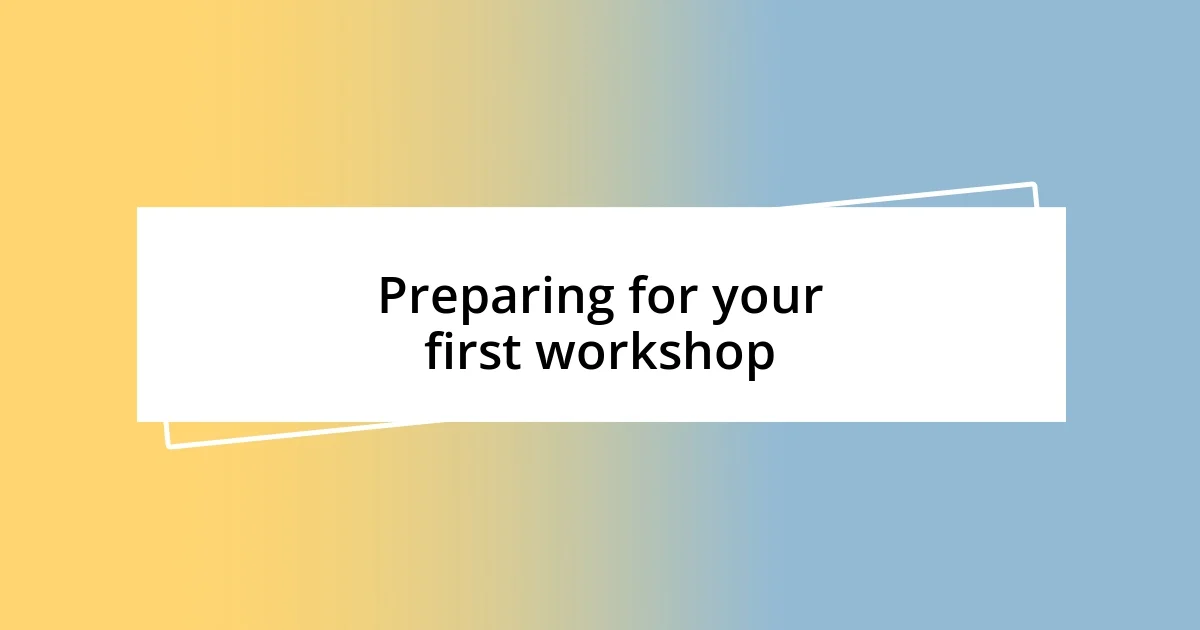
Preparing for your first workshop
Before you attend your first art appreciation workshop, it’s crucial to gather your materials. I distinctly remember my first workshop; I was so excited that I threw a bunch of supplies into my bag without thinking. On the first day, I realized I forgot essential items like sketch paper and paintbrushes. Trust me—double-checking your supplies can save you from feeling unprepared and anxious.
Familiarizing yourself with the workshop’s content can significantly enhance your experience. I often glance at the themes or techniques to be covered, which allows me to enter with a mindset geared towards curiosity and exploration. Have you ever walked into a situation feeling a bit lost? I certainly have. Knowing what to expect helps reduce those jittery feelings and helps you focus more on creativity than on confusion.
Lastly, don’t underestimate the importance of a relaxed mindset. Before my first workshop, I spent a restless night worrying about how my skills would measure up. Arriving with an open heart and a readiness to learn makes all the difference. Have you considered how your attitude can shape your creative journey? A positive approach not only enriches your experiences but also cultivates connections with fellow participants. Instead of seeing it as a competition, view it as a shared journey of artistic discovery.
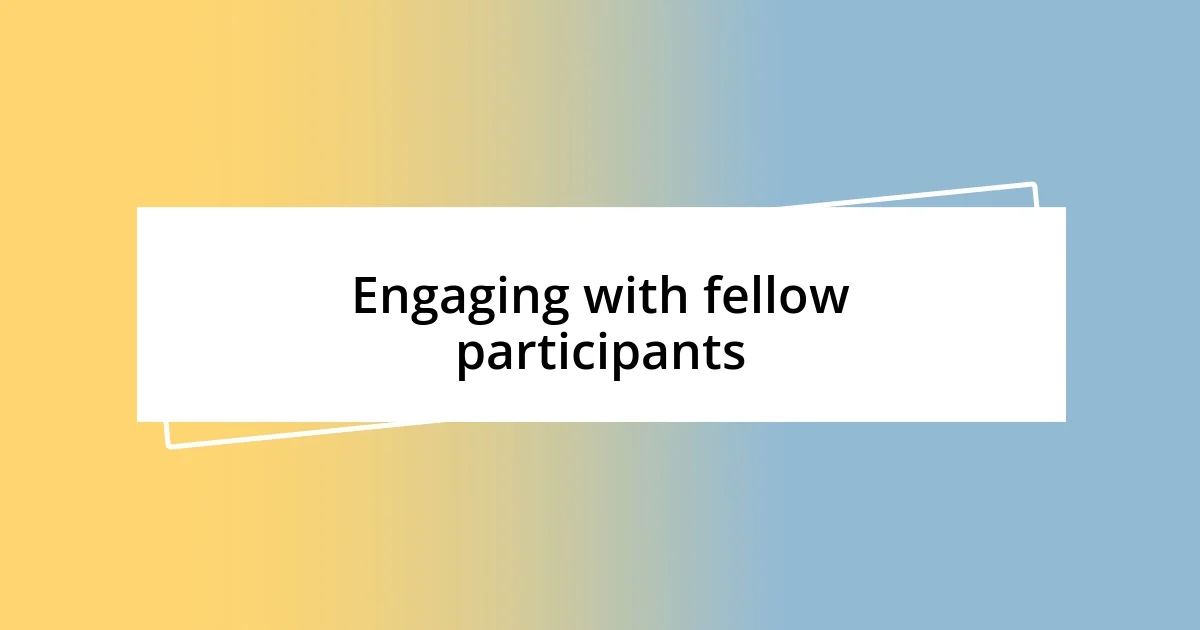
Engaging with fellow participants
Engaging with fellow participants can be one of the most rewarding aspects of art appreciation workshops. I recall a particular experience where I struck up a conversation with someone who shared my fascination for abstract art. As we discussed our interpretations of various pieces, I felt a sense of camaraderie emerging. Have you ever connected with a stranger over a shared passion? It’s amazing how quickly you can bond over something as universal as art.
I also found that collaboration during exercises can foster deeper friendships. During one workshop, we were tasked with creating a group mural, and the laughter and excitement that ensued while brainstorming ideas was infectious. I remember feeling a surge of creativity as each person contributed their unique style to the piece. Engaging with others not only enhances our understanding but also ignites a spark for exploration that we might not have uncovered alone.
Don’t underestimate the power of feedback from peers as well. I once received a thoughtful critique from someone I initially felt intimidated by, but their insights opened my eyes to new perspectives. It’s incredible how vulnerability in sharing your work can lead to meaningful exchanges. Have you ever considered how much you can learn from those around you? Embracing this dynamic can transform your experience from merely learning techniques to truly growing as an artist within a supportive community.
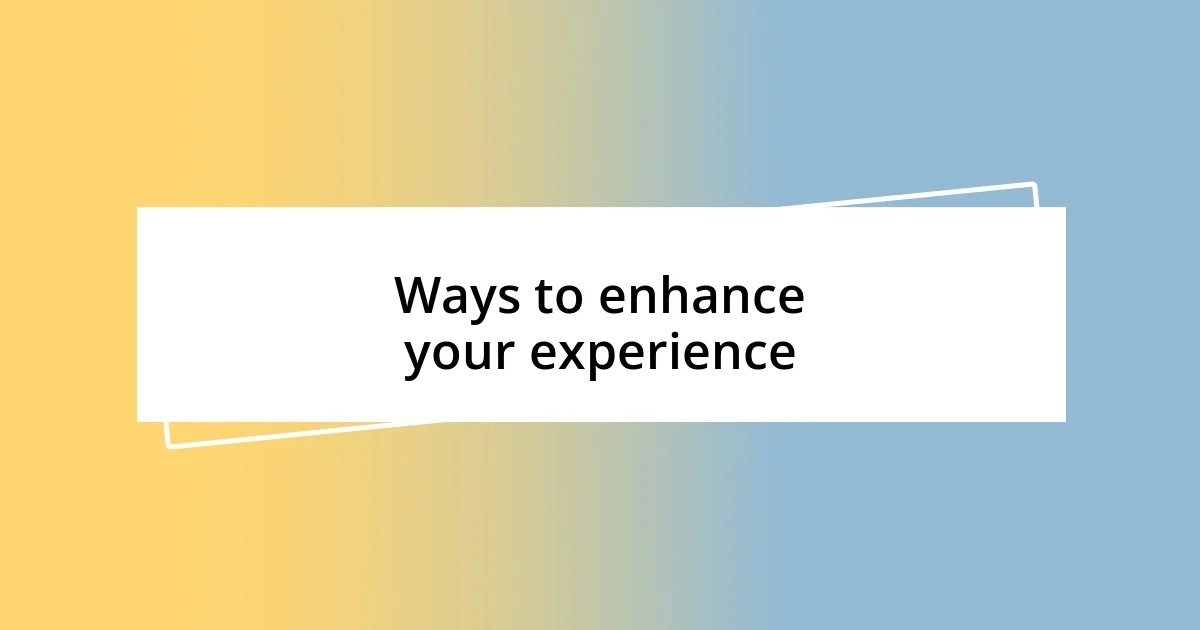
Ways to enhance your experience
I discovered that setting personal goals for each workshop significantly amplifies my experience. For instance, during one particular session, I decided to focus on enhancing my color theory skills. With that intention in mind, I approached each exercise with a strategic outlook, which not only made my learning more targeted but also helped me feel a sense of progress. Have you ever felt the satisfaction of checking off personal milestones in your creative journey?
Additionally, taking time to reflect on each workshop can deepen your appreciation for the experience. I often find myself journaling after sessions, capturing my thoughts, emotions, and even sketches of ideas that sparked my interest. This habit not only solidifies what I learned but also allows me to track my artistic evolution over time. Has there been a moment in your creative path that you wish you had documented? Doing so can reveal insights and themes that you might overlook in the hustle of regular workshops.
Lastly, don’t forget to embrace spontaneity during your time there. I once found myself mesmerized by a technique demonstrated on the fly that wasn’t even part of the agenda. By jumping in without hesitation, I discovered an unexpected passion for mixed media that has since transformed my work. Have you thought about how much joy and inspiration can come from paving your own unique path within a structured environment? This flexibility can lead to creativity that feels authentically yours.
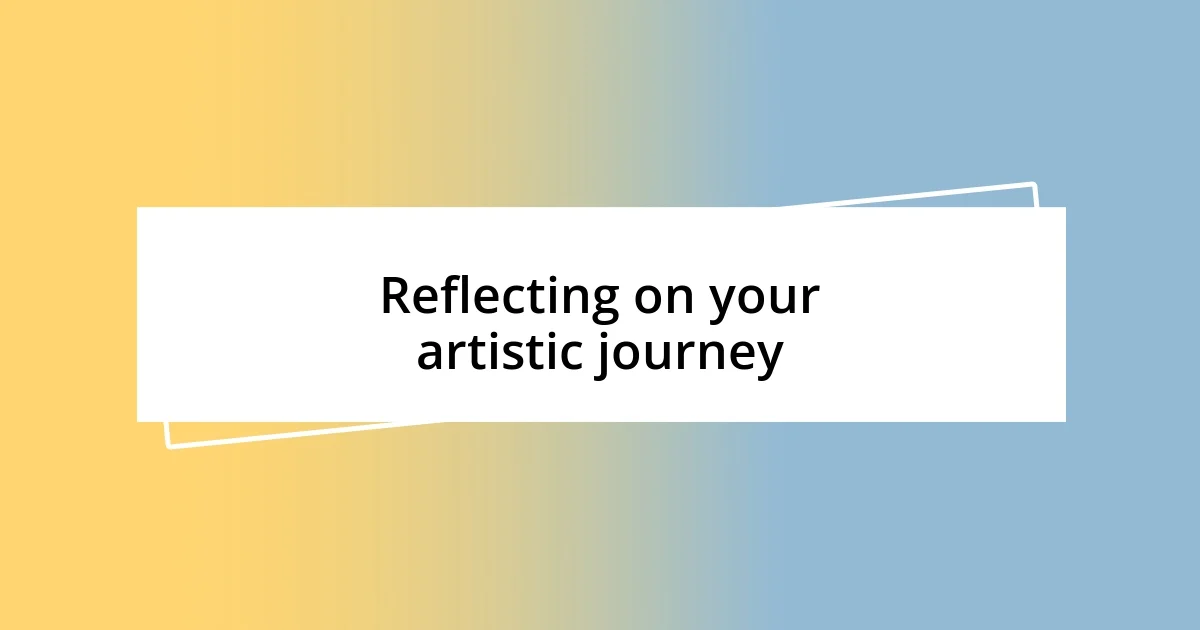
Reflecting on your artistic journey
Reflecting on my artistic journey often feels like looking through a kaleidoscope—each twist reveals a different pattern of growth. I remember a workshop where I confronted my hesitations about self-expression. I had always played it safe, sticking to what I knew. However, the encouragement from the instructor nudged me to take risks, leading me to create a piece that surprised even me. Have you ever had that moment where you pushed past your comfort zone? Those are the moments that redefine us as artists.
There’s something profoundly transformative about revisiting past works. I often flip through my portfolio, and it’s like a time capsule of my thoughts and emotions at each stage. I recall a painting I created in my early workshops; back then, it was a bold experiment with technique, yet now it feels clumsy. However, that “clumsiness” tells a story of my evolution and the endless pursuit of refinement. When you look back at your creations, what stories do they tell you?
By documenting my experiences in a visual diary—sketches, notes, and reflections—I’ve noticed patterns emerge in my interests. One entry from a workshop struck me; I had written down snippets of conversations about identity and culture, which later influenced my work. I value this practice because it connects my artistic threads and reminds me why I create. Have you considered keeping a visual record of your journey? It can be a powerful tool for deeper introspection and an avenue to explore your artistic narrative.

